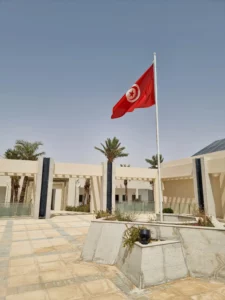What language is spoken in Tunisia? Tunisia, the jewel of North Africa, is a captivating blend of history, culture, and language, where centuries-old traditions meet a modern, globalized outlook. For travelers, businesses, and media enthusiasts alike, understanding the languages spoken in Tunisia opens a door to a unique cultural world. From Arabic to French, with rising influences of English, Tunisia is a multilingual nation that’s rich in linguistic diversity. This article will guide you through the fascinating languages spoken in Tunisia, offering insights into how they shape the nation’s identity, culture, and international appeal.

Tunisian flag
What language is spoken in Tunisia; Understanding the Primary Language of Tunisia: Arabic
In Tunisia, Arabic is the official language, forming the foundation of both the country’s written and spoken communications. Specifically, Modern Standard Arabic (MSA) is used in government, media, and formal education. However, in everyday life, Tunisians speak Tunisian Arabic, or Tunisian Derja—a lively, informal dialect filled with a unique mix of words and sounds borrowed from various languages.
Tunisian Derja: The Local Flavor of Arabic
Unlike MSA, Tunisian Derja (sometimes spelled Darija) is the dialect most Tunisians speak daily. Derived from Arabic, it is seasoned with influences from Berber, French, Italian, and Turkish —a testament to Tunisia’s rich historical interactions with different cultures. Tunisian Derja is the common language in homes, markets, and casual social settings. However, it can be difficult for non-native Arabic speakers to understand, as it differs significantly from other Arabic dialects. Learning a few phrases in Derja can open doors to meaningful local connections and a deeper cultural experience in Tunisia.
For travelers interested in picking up some Tunisian Derja phrases, this Arabic language guide provides helpful basics that could enhance your experience.
French in Tunisia: A Lingua Franca for Business and Education
One of Tunisia’s most unique linguistic characteristics is its widespread use of French, which acts as a secondary language and connects the nation to other Francophone countries. Tunisia was a French protectorate from 1881 to 1956, leaving a lasting imprint on the language landscape. Today, French is frequently used in governmental communications, media, and education, especially in scientific and technical fields.
The Role of French in Business and Media Production
For international businesses and media production companies, French’s prominence makes Tunisia an appealing destination for collaboration, especially in media, education, and professional services. Gladiators Media Agency, for example, leverages Tunisia’s bilingual population to produce content that resonates with both French-speaking and Arabic-speaking audiences, enabling creative projects to engage diverse viewers across regions.
For further reading on Tunisia’s colonial history, see this article on French influence in North Africa.
English in Tunisia: A Rapidly Growing Third Language
As the global economy brings Tunisia closer to international markets, English has become increasingly popular, especially among younger Tunisians. Although English is not as widely spoken as Arabic or French, the rising generation of English speakers is growing, particularly in technology, tourism, and higher education. English proficiency is particularly high among students, young professionals, and those working in international fields.
How English Benefits Media and Tourism in Tunisia
For companies and media producers working with Tunisian partners, this emerging fluency in English opens up broader communication possibilities and audience reach. With a multilingual workforce, Tunisia’s media sector can cater to audiences in Arabic, French, and English, offering global appeal. This multilingual capacity is crucial for media production companies like Gladiators Media Agency that wish to attract diverse viewers and deliver culturally authentic stories.
Additional Influences: Italian, Turkish, and More
Given Tunisia’s location on the Mediterranean coast and its historical ties with Italy and the Ottoman Empire, the linguistic influence of Italian and Turkish is also present. Coastal regions like Tunis and La Goulette have notable Italian-speaking communities, and many Tunisians are familiar with Italian through media and tourism. Although Turkish is less commonly spoken, its historical impact on the vocabulary and culture of Tunisia is undeniable.
For more on Tunisia’s history with the Mediterranean region, explore this resource on Mediterranean cultural influences.
Embracing Tunisia’s Multilingual Identity: A Treasure for Media and Culture
Tunisia’s linguistic diversity is more than just a unique trait; it is a bridge that connects different cultures, eras, and global perspectives. For media companies like Gladiators Media Agency, Tunisia’s rich language diversity allows for the production of content that feels both locally grounded and universally appealing. By leveraging the nation’s bilingual (and increasingly trilingual) population, companies can create media projects that not only capture the essence of Tunisia but also resonate on an international scale.
Whether you’re a traveler eager to experience the culture firsthand, a businessperson seeking opportunities in North Africa, or a media professional interested in a multilingual setting, Tunisia offers a welcoming and vibrant linguistic environment that reflects centuries of cultural exchange and evolution.
Discover how Gladiators Media can help you navigate Tunisia’s linguistic landscape for your next media production. Visit Gladiators Media’s About Us page for more information on our work and services in Tunisia.
Conclusion
Tunisia’s linguistic diversity—marked by Arabic, French, and increasingly English—adds profound value to its cultural identity and global relevance. By appreciating and working within this multilingual framework, companies and individuals alike can forge deeper, more meaningful connections in Tunisia, a place where language truly brings people together.
